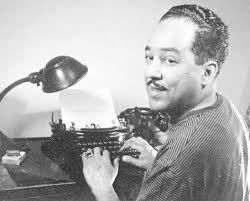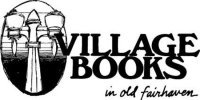Ned Hayes's Blog, page 11
March 10, 2018
Poem: Hibernation, Warming
by Kevin Craft
Wind kicks a few cups down the alley.
Pocketful of stones, a greasy lot.
Morning chill in fleeting sunlight.
You’d rather stay under this blanket agreement.
Not any storm can house you off the cuff.
The troposphere brushes your cold turned cheek.
Wake up. Get the child to school.
Now you are alone in this story
of cornflakes and Tuesday frost.
If you smell gas leak, all the more reason.
If you can walk back your talking point
happier still. Confusion in the hypodermis.
Poverty of whiteness
or hostile witness —
you’ll need a hole to crawl into
soon enough. Who lingers
finds the daylight wary. Who wavers
stands for nothing still. Hyper
nation state of being always out of
reach for the sky. Though you thought
your silence golden.
Though you felt like running
until your feet grew wings. This very morning
a crooked heartbeat stalked you out the door.

[Read more Poetry Posts]
published originally in Seattle Review of Books
Poem: Hibernation, Warming was originally published on Ned Hayes
March 7, 2018
Bookstores: Elliott Bay Book Company
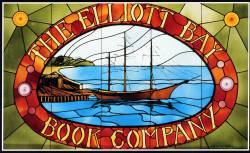 I fell in love with the Elliott Bay Book Company at first sight. I was in college, and I was visiting on a “Literature and the Arts” group trip. The classic old-Seattle brick building, the funky Pioneer Square location, the meandering labyrinth bookshelves, the levels of book topics rising in ranked stacks, the cards filled with hand-written bookstore clerk recommendations, the nearly hidden basement used book room, and the endless literary discoveries that could be made — all of these things enthralled me at Elliott Bay.
I fell in love with the Elliott Bay Book Company at first sight. I was in college, and I was visiting on a “Literature and the Arts” group trip. The classic old-Seattle brick building, the funky Pioneer Square location, the meandering labyrinth bookshelves, the levels of book topics rising in ranked stacks, the cards filled with hand-written bookstore clerk recommendations, the nearly hidden basement used book room, and the endless literary discoveries that could be made — all of these things enthralled me at Elliott Bay.
For years after, I visited Seattle during summers and holiday breaks. Seattle’s bookish Northwest culture seemed a kind of attainable heaven to me post-college, when I was living most of my working life in the alienating environment of Los Angeles (symptomatic of this is that nearly all the bookstores I once loved in Los Angeles have now closed, with the exception of Vroman’s, thank god). Part of my semi-annual pilgrimage to Seattle was, of course, time spent at the wonderful bookstores of Seattle, chief among them Elliott Bay in Seattle’s Pioneer Square. And eventually, I had the pleasure of moving to the Pacific Northwest.
Many of my most treasured literary memories have occurred at Elliott Bay. In the early 1990s, I was visiting Elliott Bay one summer, and I realized that the literary magazine in which my first published poem would appearwas due to be published soon. I looked for the journal in the display rack, and lo and behold, there it was: The Mid-American Review vol. 47 — featuring the poem “Transfiguration” by Ned Hayes (this poem now included in my published poetry collection Glossolalia). I had found my own first publication, sitting there on a shelf, waiting to be read, at Elliott Bay.
 Elliott Bay is such an experiential touchstone for me, that I don’t even think of the geographical location of “Elliott Bay” itself when someone mentions it — many of my bookish friends in Seattle are the same way. I well remember when a friend was describing her sister’s engagement, and how her boyfriend took her to a romantic overlook at “Elliott Bay”, and proposed. During the entire course of the story, I was terribly confused by a marriage proposal happening in a bookstore. Where was there a romantic overlook inside the bookstore? Was there an upper level I was unaware of? Of course, my friend was talking about the geographical feature, not the bookstore.
Elliott Bay is such an experiential touchstone for me, that I don’t even think of the geographical location of “Elliott Bay” itself when someone mentions it — many of my bookish friends in Seattle are the same way. I well remember when a friend was describing her sister’s engagement, and how her boyfriend took her to a romantic overlook at “Elliott Bay”, and proposed. During the entire course of the story, I was terribly confused by a marriage proposal happening in a bookstore. Where was there a romantic overlook inside the bookstore? Was there an upper level I was unaware of? Of course, my friend was talking about the geographical feature, not the bookstore.
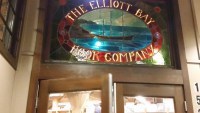 I also met several of my literary heroes in the reading room in the basement wine-cellar reading room at Elliott Bay. For years, I was a faithful attendee at readings by various literati. Elliott Bay has hosted so many of my favorite authors I’ve lost count. A few are very bright in my memory. After working for years on a book (Coeur d’Alene Waters) modeled on the work of journalist and National Book Award winning novelist Pete Dexter, I had the pleasure of meeting him at Elliott Bay and spending some time after his reading talking about writing and books. I also had the great pleasure of meeting the late Thom Jones, the Olympia janitor who vaulted to fame with his anguished and precisely chiseled stories in The New Yorker, and became a literary superstar.
I also met several of my literary heroes in the reading room in the basement wine-cellar reading room at Elliott Bay. For years, I was a faithful attendee at readings by various literati. Elliott Bay has hosted so many of my favorite authors I’ve lost count. A few are very bright in my memory. After working for years on a book (Coeur d’Alene Waters) modeled on the work of journalist and National Book Award winning novelist Pete Dexter, I had the pleasure of meeting him at Elliott Bay and spending some time after his reading talking about writing and books. I also had the great pleasure of meeting the late Thom Jones, the Olympia janitor who vaulted to fame with his anguished and precisely chiseled stories in The New Yorker, and became a literary superstar.
 Whenever I’ve been overwhelmed and unable to write, I’ve gone to Elliott Bay for succor and support, and more than not, I’ve found exactly the right book or found the right literary encounter that has shaken me out of my writing morass. In the 2000s, I helped to run a technology startup based in Pioneer Square, and on my lunch hour I was able to sneak away to spend a precious hour reading in the stacks, have a quick bite of lunch in their cafe, and remind myself of my literary calling. In fact, the presence of Elliott Bay near at hand probably was what helped me to produce my medieval novel Sinful Folk during a very intense time in my life. My personal writing history is intertwined with the history and legacy of Elliott Bay.
Whenever I’ve been overwhelmed and unable to write, I’ve gone to Elliott Bay for succor and support, and more than not, I’ve found exactly the right book or found the right literary encounter that has shaken me out of my writing morass. In the 2000s, I helped to run a technology startup based in Pioneer Square, and on my lunch hour I was able to sneak away to spend a precious hour reading in the stacks, have a quick bite of lunch in their cafe, and remind myself of my literary calling. In fact, the presence of Elliott Bay near at hand probably was what helped me to produce my medieval novel Sinful Folk during a very intense time in my life. My personal writing history is intertwined with the history and legacy of Elliott Bay.
In fact, all of Seattle’s literary history is bound up with Elliott Bay. The bookstore was first opened in 1973 by Walter Carr, who hired laid-off Boeing workers to help build the shelves in the historic (1890) Globe Building (1st Avenue and Main Street). Then, in 1998, Elliott Bay was sold to Third Place Books owners, who soon offered the store to an employee, Peter Aaron. He took over operations in 1999.
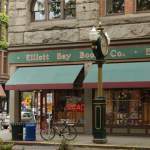
Elliott Bay old location in Pioneer Square
In its 38 years of bookselling in Pioneer Square, Elliott Bay became established as the town’s premier book shop, and since 1979 it featured a popular basement café and in recent years held about 500 author reading events per year. The Associated Press listed Elliott Bay as one of America’s nine “destination” bookstores. The store was rightfully known as “the heart of Seattle’s literary community.”Therefore, it was with great trepidation that I heard in 2009 that Elliott Bay was going out of business, or downsizing, or at the very least, changing location (the rumors varied!). All of literary Seattle was shaken by the news that this mainstay of Pioneer Square was leaving their happy environs. It turned out that the rumors were all — to some extent — exactly true.

6/15/2011– Peter Aaron, owner of Elliott Bay Book Company
Photo ©2011 Stuart Isett.
Elliott Bay was on the verge of going out of business, and for years, the bookstore had struggled to make ends meet in their Pioneer Square location. The Bush recession, some negative experiences in Pioneer Square, a lack of parking and an overall lack of people flowing through made the bookstore business very hard. Owner Peter Aaron even thought he’d have to close Elliott Bay‘s doors for good.
But instead of closing, Aaron found a new location. Elliott Bay pulled up roots from its iconic storefront in Pioneer Square and relocated to an commodious old Ford truck-repair garage on Capitol Hill in Seattle. Thousands of books, disassembled shelves and a staff of 38 were moved across town to a renovated space at 1521 10th Ave. on Capitol Hill. The new neighborhood, a couple blocks north of Seattle University, has morphed in recent years from an area known for nightclubs into one that has a mix of businesses, including popular restaurants like Oddfellows Café, Bimbos Cantina and Boom Noodle.
I must admit that the new location for Elliott Bay is marvelous: sunlight streams through loft-style windows at the front of the store, exposed beams in the 19 foot ceilings catch the light, the ancient wood floors still creak, and the bookstore still feels cozy and meandering (although it’s not quite as labyrinthine as the version in the old location). And the bookstore has been an immediate success in its new location. Elliott Bay livened up a quiet stretch of Capitol Hill between Pine and Pike streets, and the new location has been nicely surrounded by new restaurants and shops.
Aaron has kept the focus of Elliott Bay on four elements he names as key: 1) a welcoming, commodious and attractive space in which to browse, ponder and linger with books; 2) as broad, varied and authoritative a selection of titles, authors and presses as possible (20,000 square feet, 150,000 titles); 3) a comprehensive schedule of author events— more than 500 readings each year; and 4) by far the most important of all, a staff of excellent booksellers—people deeply and passionately engaged with books, who love to share their enthusiasm.
Elliott Bay Book Company is one of my literary touchstones, and I’m happy to share that bookstore experience with my readers! Enjoy!
Find my books at Elliott Bay Book Company

[Read more BOOKSTORE POSTS]
Pinterest – Ned Hayes Bookstore Board
Bookstores: Elliott Bay Book Company was originally published on Ned Hayes
March 4, 2018
Poem: Let America Be America Again
Let America Be America Again
Langston Hughes
Let America be America again.
Let it be the dream it used to be.
Let it be the pioneer on the plain
Seeking a home where he himself is free.
(America never was America to me.)
Let America be the dream the dreamers dreamed—
Let it be that great strong land of love
Where never kings connive nor tyrants scheme
That any man be crushed by one above.
(It never was America to me.)
O, let my land be a land where Liberty
Is crowned with no false patriotic wreath,
But opportunity is real, and life is free,
Equality is in the air we breathe.
(There’s never been equality for me,
Nor freedom in this “homeland of the free.”)
Say, who are you that mumbles in the dark?
And who are you that draws your veil across the stars?
I am the poor white, fooled and pushed apart,
I am the Negro bearing slavery’s scars.
I am the red man driven from the land,
I am the immigrant clutching the hope I seek—
And finding only the same old stupid plan
Of dog eat dog, of mighty crush the weak.
I am the young man, full of strength and hope,
Tangled in that ancient endless chain
Of profit, power, gain, of grab the land!
Of grab the gold! Of grab the ways of satisfying need!
Of work the men! Of take the pay!
Of owning everything for one’s own greed!
I am the farmer, bondsman to the soil.
I am the worker sold to the machine.
I am the Negro, servant to you all.
I am the people, humble, hungry, mean—
Hungry yet today despite the dream.
Beaten yet today—O, Pioneers!
I am the man who never got ahead,
The poorest worker bartered through the years.
Yet I’m the one who dreamt our basic dream
In the Old World while still a serf of kings,
Who dreamt a dream so strong, so brave, so true,
That even yet its mighty daring sings
In every brick and stone, in every furrow turned
That’s made America the land it has become.
O, I’m the man who sailed those early seas
In search of what I meant to be my home—
For I’m the one who left dark Ireland’s shore,
And Poland’s plain, and England’s grassy lea,
And torn from Black Africa’s strand I came
To build a “homeland of the free.”
The free?
Who said the free? Not me?
Surely not me? The millions on relief today?
The millions shot down when we strike?
The millions who have nothing for our pay?
For all the dreams we’ve dreamed
And all the songs we’ve sung
And all the hopes we’ve held
And all the flags we’ve hung,
The millions who have nothing for our pay—
Except the dream that’s almost dead today.
O, let America be America again—
The land that never has been yet—
And yet must be—the land where every man is free.
The land that’s mine—the poor man’s, Indian’s, Negro’s, ME—
Who made America,
Whose sweat and blood, whose faith and pain,
Whose hand at the foundry, whose plow in the rain,
Must bring back our mighty dream again.
Sure, call me any ugly name you choose—
The steel of freedom does not stain.
From those who live like leeches on the people’s lives,
We must take back our land again,
America!
O, yes,
I say it plain,
America never was America to me,
And yet I swear this oath—
America will be!
Out of the rack and ruin of our gangster death,
The rape and rot of graft, and stealth, and lies,
We, the people, must redeem
The land, the mines, the plants, the rivers.
The mountains and the endless plain—
All, all the stretch of these great green states—
And make America again!

[Read more Poetry Posts]
Poem: Let America Be America Again was originally published on Ned Hayes
March 2, 2018
Ira Glass on Inspiration
 Published on the birthday of Ira Glass, March 3, 1959
Published on the birthday of Ira Glass, March 3, 1959 Ira Glass is an inspiration to me. His work on “This American Life” is consistently entertaining, invigorating, intriguing and surprising. It’s a very creative show, constantly pushing the limits of the nonfiction documentary format. Yet, as Ira Glass shares in the video below… it took him years to figure out what he was doing.
His great piece of advice here — to produce a large volume of work in order to find your voice and your expression — rings as true as anything I’ve ever read about the creative process.
A literary update from NedNote.com
Readers can find my books at these bookstores:



Ira Glass on Inspiration was originally published on Ned Hayes
February 27, 2018
Celebrating Tim Powers
On this day, I’m celebrating the birthday of Tim Powers, SFF writer extraordinaire.
February 29, 1952
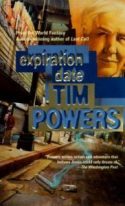 I was on a bus in Seattle when I first read a book by Tim Powers. I’d picked up a ratty paperback of Expiration Date in some used bookstore’s science-fiction section. The Edison references looked intriguing, and that was enough to hook me. However, as I read deeper into Expiration Date, I found myself enthralled and terrified. I found the world around me — outside the book — to be transformed by a hallucinatory haze, and I almost threw the book down, unable to finish, both horrified and intrigued. I had nearly forgotten the effect that finely woven words could have on one’s psyche. Yet here I was, after all these years as a reader, horrified by what I was reading, and unable to tear myself away from this vertiginous world of ghost-eaters, beheaded parents, street children with preternatural sensibilities, and re-animated half-dead corpses.
I was on a bus in Seattle when I first read a book by Tim Powers. I’d picked up a ratty paperback of Expiration Date in some used bookstore’s science-fiction section. The Edison references looked intriguing, and that was enough to hook me. However, as I read deeper into Expiration Date, I found myself enthralled and terrified. I found the world around me — outside the book — to be transformed by a hallucinatory haze, and I almost threw the book down, unable to finish, both horrified and intrigued. I had nearly forgotten the effect that finely woven words could have on one’s psyche. Yet here I was, after all these years as a reader, horrified by what I was reading, and unable to tear myself away from this vertiginous world of ghost-eaters, beheaded parents, street children with preternatural sensibilities, and re-animated half-dead corpses.
The magic that Tim Powers taught me again was that if you describe a world with deep care, profoundly accurate historical touches and artful verisimilitude, it becomes nearly impossible to distinguish that world from our own. When you then take such a world, and begin to add sorcerous or fantastical elements, readers will follow you down that terrible rabbit hole to the ends of the imagination. Powers terrified me: he wrote authentically about deeply disturbing things. For a few years, I didn’t dare to pick another Powers book up. He was good, but I wasn’t sure I wanted to enter that Twilight Zone experience of unreality again.
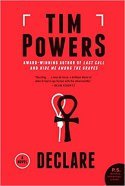 Yet when I did finally pick up another Powers book, I was enthralled in a completely different way. I found myself picking up Tim Powers new DECLARE, a precisely grounded story of Cold War spying, that happened (of course) to include sacrifices to ancient demons, infection by preternatural forces and arcane knowledge that permeated the world of British espionage. Again, it was so perfectly grounded in the real world that it was impossible to argue with any of the Cold War descriptions, the spy activity, the double-crosses and the Berlin escapades. The otherworldly elements, when they occurred, were described with the same precision and the same sense of reality, which made them even more overwhelmingly real.
Yet when I did finally pick up another Powers book, I was enthralled in a completely different way. I found myself picking up Tim Powers new DECLARE, a precisely grounded story of Cold War spying, that happened (of course) to include sacrifices to ancient demons, infection by preternatural forces and arcane knowledge that permeated the world of British espionage. Again, it was so perfectly grounded in the real world that it was impossible to argue with any of the Cold War descriptions, the spy activity, the double-crosses and the Berlin escapades. The otherworldly elements, when they occurred, were described with the same precision and the same sense of reality, which made them even more overwhelmingly real.
Once I finished DECLARE, I read it again. And I again. I was studying it, trying to unpack how Powers had performed these magic acts. This was a revelation to me: the manner in which Powers had so carefully woven together authentic historical events, real locations and well-grounded historical figures (Kiim Philby and other well-known personages appear in the novel), alongside mind-bendingly unreal occurrences and bizarre stories of assaults on Noah’s ark and interactions with ancient desert djinn.
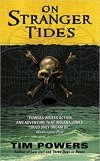 After that seminal experience with DECLARE, I found every other Powers book I could and read them assiduously. I read On Stranger Tides, and found it a maddeningly well-written pirate yarn, again drawing on deep wells of history. I read Last Call, and sank without complaint into a dangerous and magical world of card-reading and Las Vegas shenanigans and murdered gods’ children. These three — DECLARE, Stranger Tides, and Last Call — were better by far than any other books I read in the years I read them (and I read between 40-75 books a year).
After that seminal experience with DECLARE, I found every other Powers book I could and read them assiduously. I read On Stranger Tides, and found it a maddeningly well-written pirate yarn, again drawing on deep wells of history. I read Last Call, and sank without complaint into a dangerous and magical world of card-reading and Las Vegas shenanigans and murdered gods’ children. These three — DECLARE, Stranger Tides, and Last Call — were better by far than any other books I read in the years I read them (and I read between 40-75 books a year).
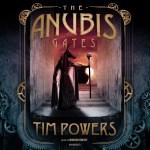 I read The Anubis Gates, and enjoyed this yarn immensely. In this book, Powers skill as a historical novelist really comes to the forefront. This is the first time-travel book that took seriously the toxic after-effects of time-travel. The story also immersed its characters deeply in England of the late 1600s, and found ways to weave threads of genuine history in among the storytelling. This was Powers’ fourth novel, and The Anubis Gates won the Philip K. Dick Award and was nominated for the Locus and BSFA. Once again, Powers found the interesting elisions in history and chinked those gaps with supernatural possibilities. In the Anubis Gates, he came up with the idea that the birth of Romanticism in the early 1800s coincided with a group of Egypt-worshipping occultic magicians. Once again, a brilliant invention that almost seems plausible.
I read The Anubis Gates, and enjoyed this yarn immensely. In this book, Powers skill as a historical novelist really comes to the forefront. This is the first time-travel book that took seriously the toxic after-effects of time-travel. The story also immersed its characters deeply in England of the late 1600s, and found ways to weave threads of genuine history in among the storytelling. This was Powers’ fourth novel, and The Anubis Gates won the Philip K. Dick Award and was nominated for the Locus and BSFA. Once again, Powers found the interesting elisions in history and chinked those gaps with supernatural possibilities. In the Anubis Gates, he came up with the idea that the birth of Romanticism in the early 1800s coincided with a group of Egypt-worshipping occultic magicians. Once again, a brilliant invention that almost seems plausible.
However, since I’d read Stranger Tides and DECLARE, The Anubis Gates didn’t have quite the impression on me that it did on other readers. I went on in my hunger to know Powers writing. I read Powers early SF novels such as Dinner at Deviant’s Palace, and saw the same hand at work, but in a slighter way. He hadn’t yet grown his historical chops or his ability to play with language and character as deeply. Yet even here, the same careful precision was evident, the same themes played out. I deeply enjoyed his older novel, The Drawing of the Dark, and this story of magic and beer was a medieval lark.
Yet by this point, I was almost getting tired of Powers. I felt I’d figured out the games he played. I knew the game and the patter.
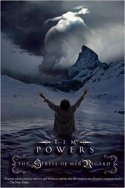
Then I found his often-forgotten masterpiece The Stress of Her Regard. And I found myself again terrified, enthralled and horrified by the evident reality of what he was describing. Powers had managed again to pull me under his hallucinatory spell. Stress of Her Regard was, by far, the best vampire/revenant book that I’d ever read. It was a masterstroke of literary innovation as well, with Lord Byron, Percy Shelley, Mary Shelley and other beloved personages from English literature striding the page, and revealing their unholy pacts with otherworldly creatures. Stress of Her Regard became my favorite book for several years.
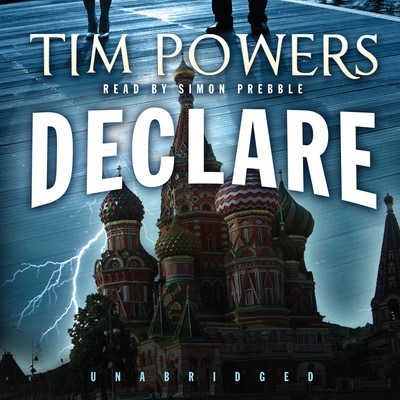 A few years after reading Stress of Her Regard, I began writing in earnest myself, and I found myself drawn back to Powers DECLARE, learning again from the master how to create a world that was tied so closely to our world of reality as to be indistinguishable. When I completed the first draft of my own novel WILDERNESS OF MIRRORS, I hand-wrote a long letter to Tim Powers, and explained to him what an inspiration he’d been to me over the years. Then I was so bold as to ask him if I could possibly use some of his DECLARE ideas in my novel, as my story of the War on Terror had been inspired by his story of the Cold War.
A few years after reading Stress of Her Regard, I began writing in earnest myself, and I found myself drawn back to Powers DECLARE, learning again from the master how to create a world that was tied so closely to our world of reality as to be indistinguishable. When I completed the first draft of my own novel WILDERNESS OF MIRRORS, I hand-wrote a long letter to Tim Powers, and explained to him what an inspiration he’d been to me over the years. Then I was so bold as to ask him if I could possibly use some of his DECLARE ideas in my novel, as my story of the War on Terror had been inspired by his story of the Cold War.
Powers was kind enough to write back, jauntily telling me he thought the idea of planting a few “easter eggs” to his books in my novel would be fun, and giving me full permission to tie our books together. He was also quite willing to read an early draft. Both of his comments were a great encouragement to my work, and I moved forward with a few additions to WILDERNESS OF MIRRORS that would show the astute reader that there were connections between the books below the waterline. I even placed a subtle easter egg in the book that referenced one of Powers’ principal characters in DECLARE.

Wilderness of Mirrors
WILDERNESS OF MIRRORS attempts to follow Powers model of finding gaps in history and filling them with imagination. So in WILDERNESS OF MIRRORS, I combine both deeply researched historical knowledge about the Middle East, China, the War on Terror, and the history of the CIA with a fantastic and otherworldly story about Chinese spirits of the air—known as tian-long —- and their interactions with human beings.
In the end, my desire is to produce a literature which is truly multivalent and goes beyond typical “spy” or “supernatural” writing into the kinds of haunting territory charted for us by Pynchon, Powers, and Powers’ old friend Philip K. Dick.
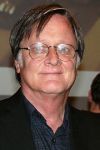
I’m happy to tell you that WILDERNESS OF MIRRORS is coming out in 2018 (the 15th draft of the novel was finally picked up for publication!), and it’s due to Powers inspiration that I completed this monstrosity of a novel. Powers has been a great inspiration to me over the years, and I wish him all the best on his leap-year birthday.
Happy birthday, Mr. Powers!

Here’s a great little series of lectures by Tim Powers on the writing craft (lifted from The works of Tim Powers )
Celebrating Tim Powers was originally published on Ned Hayes
February 26, 2018
Poem: A Woman Speaks
by Audre Lorde
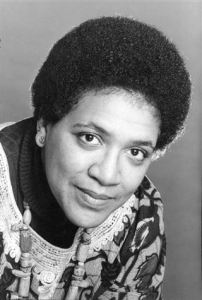 Moon marked and touched by sun
Moon marked and touched by sunmy magic is unwritten
but when the sea turns back
it will leave my shape behind.
I seek no favor
untouched by blood
unrelenting as the curse of love
permanent as my errors
or my pride
I do not mix
love with pity
nor hate with scorn
and if you would know me
look into the entrails of Uranus
where the restless oceans pound.
I do not dwell
within my birth nor my divinities
who am ageless and half-grown
and still seeking
my sisters
witches in Dahomey
wear me inside their coiled cloths
as our mother did
mourning.
I have been woman
for a long time
beware my smile
I am treacherous with old magic
and the noon’s new fury
with all your wide futures
promised
I am
woman
and not white.

[Read more Poetry Posts]
Audre Lorde, “A Woman Speaks” from The Collected Poems of Audre Lorde. Copyright © 1997 by Audre Lorde.
Poem: A Woman Speaks was originally published on Ned Hayes
February 23, 2018
Bookstores: Village Books
— Read my books at Village Books —
Village Books in Bellingham is an amazing home for books and literature in the Pacific Northwest. It’s also a place where I’ve built many fond memories and spent many wonderful afternoons.
In the early 1990s, I moved to Bellingham to work for the local newspaper, The Bellingham Herald and to attend grad school for English Literature at Western Washington University. I applied to Western and went to Western largely because my literary hero Annie Dillard had been on the faculty at Western and wrote several of her most famous pieces while living and writing at Western. Although she’d departed by the time I arrived at Western, I hoped that some of her spirit and her influence still held sway in the region (little did I know at the time, but she was working then on her first and only novel The Living, which is set in the Bellingham region).
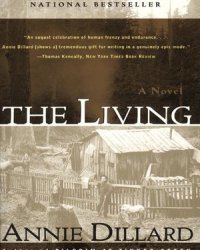 In fact, I think Dillard’s influence did remain present in the old Fairhaven district there in Bellingham, and most especially in Village Books, established in the 1980s by Chuck and Dee Robinson. At the time they opened the bookstore, Fairhaven was a downtrodden industrial district: by the time they sold the bookstore off in the 2000s, Village Books was a beloved icon, and Fairhaven had risen from the ashes to become a beautiful and restored downtown district.
In fact, I think Dillard’s influence did remain present in the old Fairhaven district there in Bellingham, and most especially in Village Books, established in the 1980s by Chuck and Dee Robinson. At the time they opened the bookstore, Fairhaven was a downtrodden industrial district: by the time they sold the bookstore off in the 2000s, Village Books was a beloved icon, and Fairhaven had risen from the ashes to become a beautiful and restored downtown district.
When I arrived in Bellingham, I had just come from 4+ years of teaching elementary school (in fact, The Eagle Tree is based partially on my teaching experience). I missed working with children at that time, and I approached Village Books about telling stories there regularly. Village Books happily signed me up as the resident storyteller for several years, and I told stories there every Tuesday night. Sometimes I read children’s books aloud, sometimes I told a classic tale, and sometimes I used mime and improv to create stories on my own. I remain grateful to Village Books for trusting me as their storyteller.
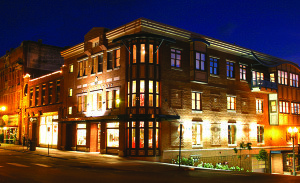 I also enjoyed many hours of evening readings at Village Books from a variety of authors. I met one of my literary heroes — Sheila Nickerson, former poet laureate of Alaska — there at Village Books, and I met Sherman Alexie there for the second time. When I had a free evening, I found myself migrating towards Village Books, to discover what new experiences they had for me that evening.
I also enjoyed many hours of evening readings at Village Books from a variety of authors. I met one of my literary heroes — Sheila Nickerson, former poet laureate of Alaska — there at Village Books, and I met Sherman Alexie there for the second time. When I had a free evening, I found myself migrating towards Village Books, to discover what new experiences they had for me that evening.
In 1996, I even read through my graduation ceremony with a book from Village Books (reading thru such ceremonies is an old tradition of mine). When I finished grad school and left Bellingham, I continued to enjoy Village Books from time to time, bringing my family and friends to visit the bookstores on weekend excursions from the Seattle area.
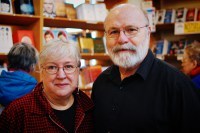 Village Books has a wonderful backstory as well. In 1980, Chuck and Dee Robinson came to the down-trodden Fairhaven district in Bellingham and opened Village Books on a wing and a prayer. When the Robinsons opened Village Books in 1980, interest rates were higher than 20 percent and Fairhaven was a “rather sorry looking place” with empty storefronts and vacant lots, Bellingham historian Brian Griffin said in his book, Fairhaven: A History.
Village Books has a wonderful backstory as well. In 1980, Chuck and Dee Robinson came to the down-trodden Fairhaven district in Bellingham and opened Village Books on a wing and a prayer. When the Robinsons opened Village Books in 1980, interest rates were higher than 20 percent and Fairhaven was a “rather sorry looking place” with empty storefronts and vacant lots, Bellingham historian Brian Griffin said in his book, Fairhaven: A History.
The Robinsons weathered tough times in the bookstore business. In the 1990s, economic malaise threatened small businesses like theirs. And big box retailers like Borders and Barnes & Noble threatened to take them out too. Finally, the rise of Amazon also was a storm cloud on the horizon. Finally, after much travail, the Robinsons found their way to a new vision of a bookstore as a civic hub, and as a special place where you could find not only new books, but also specialty, used and self-published indie books. They created a genuinely welcoming place for book lovers of all ages, and that spirit has become a thriving bookish community.
 Over time, they added the iconic Colophon Cafe and the store Paper Dreams in the same building. They even created The Chuckanut Radio Hour, a radio variety show they launched in January 2007 with a featured author as a guest. Writers who have been on the show include Sherman Alexie, Tom Robbins, Cheryl Strayed and Ruth Ozeki.
Over time, they added the iconic Colophon Cafe and the store Paper Dreams in the same building. They even created The Chuckanut Radio Hour, a radio variety show they launched in January 2007 with a featured author as a guest. Writers who have been on the show include Sherman Alexie, Tom Robbins, Cheryl Strayed and Ruth Ozeki.
In 2016, the Robinsons decided to retire from the book business, after 36 years. Instead of sellng off to some conglomerate, they sold the store to their own booksellers — their friends and colleagues who had been handling most of the day-to-day operations of the bookstore over the past few years. The new owners became longtime employees Kelly Evert, Paul Hanson and Sarah Hutton. The trio bought the Fairhaven and Lynden locations of Village Books along with gift store Paper Dreams.
 “Our confidence in them is so strong,” Chuck Robinson said in an interview, adding the new owners shared the values the business was built on and will continue its community-oriented focus. Evert and Hanson have each worked in the business for 5 ½ years, and Hutton for 11 years. They have years of experience as managers, booksellers and retailers.
“Our confidence in them is so strong,” Chuck Robinson said in an interview, adding the new owners shared the values the business was built on and will continue its community-oriented focus. Evert and Hanson have each worked in the business for 5 ½ years, and Hutton for 11 years. They have years of experience as managers, booksellers and retailers.
These days, Fairhaven is a vibrant place to shop, eat and otherwise hang out. Village Books continues to grow, while newer Lynden Village Books store is exceeding expectations.
Village Books is one of my literary touchstones, and I’m happy to share that bookstore experience with my readers! Enjoy!
Find my books at Village Books
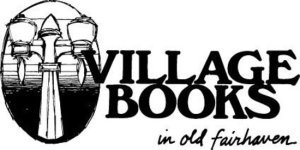
Enjoy a video about Village Books
[Read more BOOKSTORE POSTS]
Pinterest – Ned Hayes Bookstore Board
Bookstores: Village Books was originally published on Ned Hayes
February 18, 2018
On Writing: Withholding the “True” Story in Toni Morrison's Beloved
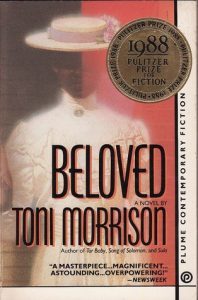 I’ve been pondering writing a new novel that illuminates a horrific period in my family’s heritage. As I re-read Toni Morrison’s Beloved, it became clear to me that her techniques of emotional withholding and surrealistic storytelling would be quite useful in telling the story that I’m tentatively calling A Mercy Upon Us.
I’ve been pondering writing a new novel that illuminates a horrific period in my family’s heritage. As I re-read Toni Morrison’s Beloved, it became clear to me that her techniques of emotional withholding and surrealistic storytelling would be quite useful in telling the story that I’m tentatively calling A Mercy Upon Us.The verifiable family history I would use in my novel is the story of my grandfather’s parents. They were two young immigrants from Holland, with four children in tow, and one in the oven. They brought with them their elderly grandmother, to help with the children and the new baby about to be born. However, the only English speaker was the father. Shortly after arriving in this New World, the father contracted tuberculosis and died. The mother had just given birth, and alone, alienated, and bereft in this strange land, she sank into post-partum depression, and shortly thereafter committed suicide. The oldest child, Sue, assisted the elderly grandmother in adopting out the other children to families who gave them new names and new histories. Twenty-five years later, Sue went back and found each of the children, and told them who they really were, and where they came from. She gave them their true story – which was both a curse and a blessing. My grandfather may have never recovered from the knowledge that he was not who he had thought he had been, and seemed to carry it as a dark weight his whole life.
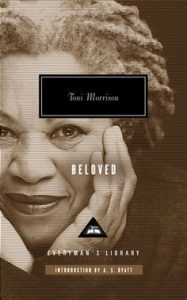 Although this story has not a hint of magic about it (except perhaps the magic of memory), I found in Toni Morrison’s work a number of techniques that may help me to understand how to think through this book from the perspective of my narrator Sue. First, one technique I find quite useful is the way that Morrison describes events and persons through a lens that is unusual and lends a patina of strangeness to a scene, hinting just barely to her readers that all is not as it first appears. I could use this technique to give alternate versions of what happens, in a Rashomon type of multi-valent storytelling. For now, though, I think I’m going to just focus on Sue’s perspective, and let the story come out naturally as she tells it to the siblings she finds in her long quest to tell them the truth.
Although this story has not a hint of magic about it (except perhaps the magic of memory), I found in Toni Morrison’s work a number of techniques that may help me to understand how to think through this book from the perspective of my narrator Sue. First, one technique I find quite useful is the way that Morrison describes events and persons through a lens that is unusual and lends a patina of strangeness to a scene, hinting just barely to her readers that all is not as it first appears. I could use this technique to give alternate versions of what happens, in a Rashomon type of multi-valent storytelling. For now, though, I think I’m going to just focus on Sue’s perspective, and let the story come out naturally as she tells it to the siblings she finds in her long quest to tell them the truth.
In Morrison’s novel, the dead ghost of a child re-emerges into the lives of the main characters as a grown fully fleshed woman who has “willed” her way back into existence. At first, they do not know who she is, or what she represents in their lives. Morrison mirrors the characters’ lack of context for “Beloved” by providing an the initial introduction of Beloved as a character through poetic language that paints the situation as strange and imaginatively unreal. No one reacts to the scene, but the description is strange and compelling:
A fully dressed woman walked out of the water. She barely gained the dry bank of the stream before she sat down and leaned against a mulberry tree. All day and all night she sat there, her head resting on the trunk in a position abandoned enough to crack the brim in her straw hat. Everything hurt but her lungs most of all. Sopping wet and breathing shallow she spent those hours trying to negotiate the weight of her eyeballs. …. She had new skin, lineless and smooth, including the knuckles of her hands…. four times the woman drank from the speckled tin cup as though she had crossed a desert. (Morrison 50)
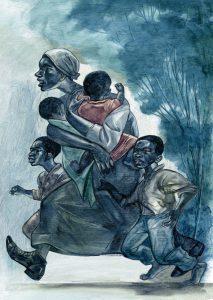 The critical elements here are the indications that this “woman” is not of our world: her lungs hurt, her eyeballs have an unusual weight, and she has new skin. Finally, she has just “crossed a desert.” All of these mentions tell the reader that this woman is experiencing reality in a different way than the other characters. Of course, after you’ve read the book once, you recognize the metaphors of birthing and of new life in the world. However, at first read, these hints simply give her reality a radically different angle, an unusual and poetic perspective. The hints reverberate and pile up though, over time, until the weight of what they might mean is inescapable.
The critical elements here are the indications that this “woman” is not of our world: her lungs hurt, her eyeballs have an unusual weight, and she has new skin. Finally, she has just “crossed a desert.” All of these mentions tell the reader that this woman is experiencing reality in a different way than the other characters. Of course, after you’ve read the book once, you recognize the metaphors of birthing and of new life in the world. However, at first read, these hints simply give her reality a radically different angle, an unusual and poetic perspective. The hints reverberate and pile up though, over time, until the weight of what they might mean is inescapable.
In the same manner, I believe that the mother’s suicide in my novel can be more powerful if I don’t actually say it by name, but instead allow it to be hinted at and illuminated by metaphor until the possibility of it, and then the reality of it becomes something heavy and inescapable in the reader’s mind – an overwhelming radical change that is referenced only glancingly by the other characters, but gradually insists on its own reality, much as Beloved gradually insists on her reality in the lives of the characters in Morrison’s work. Metaphor and oblique references are critical tools to invoke an alternate story, or to hint at a story that can’t be told overtly.
If I need to hint at the story, it’s also necessary to show how my other characters are gradually informed. Specifically, I think withholding the actual story from my readers, and allowing it to come out gradually as Sue tells it to other people, is a technique worth exploring. Morrison does this adroitly. For example, it is absolutely lovely to see how she has her characters interact with “Beloved.” They field seemingly innocuous questions and discussion, and then Morrison allows the realization of the import of those questions to land later, at the end of the discussion, so that the true meaning of that conversation reverberates backwards through the story. Here’s one instance of this technique: “Now she noticed something more. The questions Beloved asked: ‘Where are your diamonds?’ ‘Your woman she never fix up your hair?’ And most perplexing: Tell me your earrings. How did she know?” (Morrison 63). The cold realization of something unnatural – knowledge ungained from the other characters – hits the characters after the reader has already realized something is strange about the woman’s knowledge.
Finally, Morrison brings the “alternate” story (or the backstory) into her character’s lives through visceral experiences that are inserted into a present narrative. She forces the story into the main narrative by taking the hints much further, until their import is inescapable. Here’s a later scene that shows “Beloved” demonstrating her story – and her ghostly reality – to the other characters:
Beloved, inserting a thumb in her mouth along with the forefinger, pulled out a back tooth. There was hardly any blood…. Beloved looked at the tooth and thought, This is it. Next would be her arm, her hand, a toe. Pieces of her would drop maybe one at a time, maybe all at once. Or on one of those mornings…she would fly apart. It is difficult keeping her head on her neck, her legs attached to her hips when she is by herself. (Morrison 133)
Again, in this scene, Morrison does not make the back-story of “Beloved” into something unreal or ghostly, but grounds in realistically-described moments of experience that the other characters can actually sense and feel and see. Her character’s tooth removal seems very realistic and very sensory. Therefore, when her character ponders her own unreality, and the difficulty of living as a “ghost” in the human world, the reader can suspend disbelief and travel with her narrative, because the previous moments were firmly grounded. Instead of being caught in abstractions, the reader starts from an anchor point that is firmly grounded in the everyday world. What Morrison does so amazingly well is to make the magic real to the characters, and thus, to the readers.
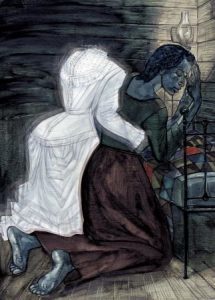 The realistically described experiences of “Beloved” thus brings the realization of the back-story (or alternate story) home to her readers with a powerful punch. Much later in the book, after all of these hints and experiences have slowly collected like drops wearing down the disbelief of her other characters, Morrison finally brings a waterfall of realization. Here’s where Morrison brings the truth home: The “sweet conviction” in her eyes “almost made him wonder if it had happened at all, eighteen years ago, that while he and Baby Suggs were looking the wrong way, a pretty little slavegirl had recognized a hat, and split to the woodshed to kill her children” (Morrison 158). This is the moment that Morrison brings out the main pivotal moment in the backstory. Because of her consistent buildup of this story, the description lands with a satisfying wallop of pain.
The realistically described experiences of “Beloved” thus brings the realization of the back-story (or alternate story) home to her readers with a powerful punch. Much later in the book, after all of these hints and experiences have slowly collected like drops wearing down the disbelief of her other characters, Morrison finally brings a waterfall of realization. Here’s where Morrison brings the truth home: The “sweet conviction” in her eyes “almost made him wonder if it had happened at all, eighteen years ago, that while he and Baby Suggs were looking the wrong way, a pretty little slavegirl had recognized a hat, and split to the woodshed to kill her children” (Morrison 158). This is the moment that Morrison brings out the main pivotal moment in the backstory. Because of her consistent buildup of this story, the description lands with a satisfying wallop of pain.
In Morrison’s techniques of metaphorical description, backstory hints, and visceral experience, I see some tools I can use in gradually revealing the “truth” of my story Mercy Upon Us. I hope that when I’m able to take the time to write that novel that I’m able to effectively use these techniques to communicate as powerfully as Morrison did in Beloved.
A literary update from NedNote.com
Readers can find my books at these bookstores:



WORKS CITED
Morrison, Toni. Beloved. New York: Penguin Group, 1988.
On Writing: Withholding the “True” Story in Toni Morrison’s Beloved was originally published on Ned Hayes
February 15, 2018
Poem: won’t you celebrate with me
Black History Month: February
won’t you celebrate with me
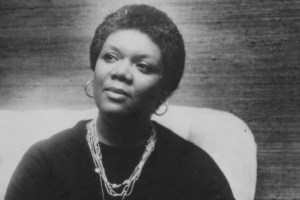
Lucille Clifton, 1936 – 2010
won’t you celebrate with me
what i have shaped into
a kind of life? i had no model.
born in babylon
both nonwhite and woman
what did i see to be except myself?
i made it up
here on this bridge between
starshine and clay,
my one hand holding tight
my other hand; come celebrate
with me that everyday
something has tried to kill me
and has failed.

[Read more Poetry Posts]
Poem: won’t you celebrate with me was originally published on Ned Hayes
February 10, 2018
Bookstores: Powell's in Portland
 Read at Powell’s City of Books
In 1990, I was new to the Pacific Northwest. Even in the hinterlands of Spokane though, where I was an undergraduate, rumors of a city of books had filtered out. So on the first Oregon roadtrip with my then-girlfriend, we stopped in Portland and I beheld — for the first time — the vast and amazing Powell’s City of Books in Portland Oregon. It was simply astonishing to see an entire city block converted into a wide-ranging and spectacularly well-organized bookstore.
Read at Powell’s City of Books
In 1990, I was new to the Pacific Northwest. Even in the hinterlands of Spokane though, where I was an undergraduate, rumors of a city of books had filtered out. So on the first Oregon roadtrip with my then-girlfriend, we stopped in Portland and I beheld — for the first time — the vast and amazing Powell’s City of Books in Portland Oregon. It was simply astonishing to see an entire city block converted into a wide-ranging and spectacularly well-organized bookstore.Time passed bookishly. In the first hour, I felt as if I were momentarily present in a dream-library I’d always wished to visit. In the second hour, I grew convinced that the bookstore never ended — that it was a labyrinth of texts like that found in Umberto Eco’s The Name of the Rose. In the third hour, I was sure I’d been transported to the library of Numenor in Gondor, where Gandalf researches the history of the Great Ring and the origins of Sauron in The Lord of the Ring. Because if you couldn’t find that kind of arcane knowledge in a bookstore of this magnitude and power, where would you find it? I drowned in bookish delight at Powell’s and came up from the experience water-logged with wordy pleasure.
Since that time, I’ve had the pleasure of introducing many other readers to the fabulous experience of Powell’s in Portland. My children now consider a visit to Powell’s to be a mandatory part of their intermittent visits to Portland, and it’s interesting to know what a big part this seminal bookstore has played in their experience of what a bookstore can be.
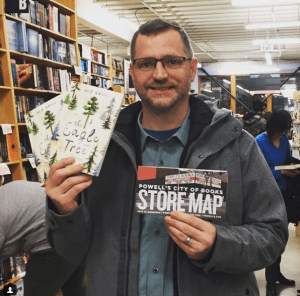
The Eagle Tree at Powell’s Books in Portland
A few years ago, I was so excited to find my own books at Powell’s and to realize that my books had penetrated this literary fortress was a great pleasure. If schedules all align, I’m very excited to do a special reading next year of a new special collector’s edition of my national bestselling novel The Eagle Tree at Powell’s. For me, being part of the Powell’s experience is the pinnacle of literary success.
In fact, the bookstore has become its own kind of amazing cornerstone to the city of Portland as well — it is a veritable beehive of literary activity and community-building. Today, Powell’s now hosts over 500 author events a year, in addition to children’s storytimes, writing workshops, game demonstrations, and book clubs. Powell’s has now grown to employ over 530 people across five Portland-area stores and Powells.com. Their book inventory exceeds two million volumes, which is pretty incredible. I’d like to think that even Amazon took a few notes from Powell’s when they were first starting out in the 1990s.

The history of Powell’s is an interesting one. Back in 1971, Michael Powell was encouraged by friends and professors (including novelist Saul Bellow), to open a bookstore. Michael’s dad, Walter Powell, a retired painting contractor, worked one summer with Michael in the Chicago store. Powell’s corporate site says that Walter so enjoyed his experience that upon returning to Portland he opened his own used bookstore. In 1979, Michael joined Walter in Portland, creating a bookstore with a unique recipe that, though viewed as unorthodox, worked: used and new, hardcover and paperback, all on the same shelf; open 365 days a year; and staffed by knowledgeable and dedicated booklovers.
This recipe of old and new together in one vast menagerie of books has been an amazing success, and now it’s being mirrored by many other bookstores I know and love, most especially Elliot Bay Bookstore in Seattle and my hometown bookstores of Orca Books and Browsers Bookstore, here in Olympia Washington.
Forty years later, Powell’s Books is now a third-generation family-owned business with Emily Powell at the helm.
“My grandfather taught me that our job is to connect the writer’s voice with the reader’s ear and not let our egos get in between. My father taught me not only the love of the book itself but also how to love the business of bookselling.” — Emily Powell, Powell’s owner
Powell’s City of Books is one of my literary touchstones, and I’m happy to share that bookstore experience with my readers! Enjoy!
Find my books at Powell’s

Pinterest – Ned Hayes Bookstore Board
 [Read more BOOKSTORE POSTS]
[Read more BOOKSTORE POSTS]Pinterest – Ned Hayes Bookstore Board
Bookstores: Powell’s in Portland was originally published on Ned Hayes


